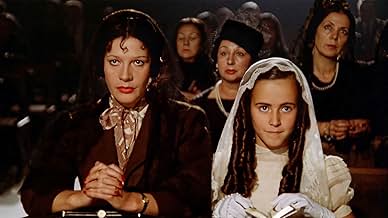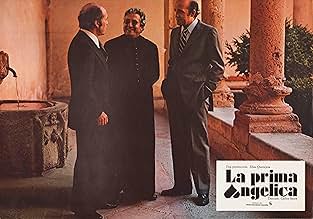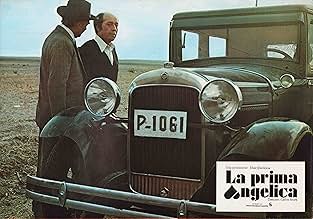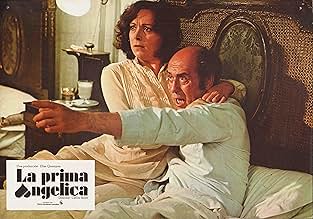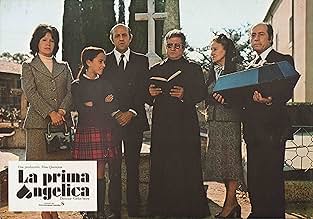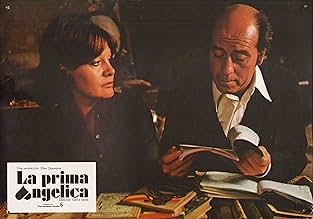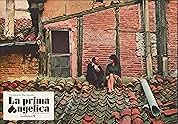IMDb RATING
7.3/10
1.3K
YOUR RATING
After being given permission to re-inter his mother's body in their family vault, a middle-aged man who survived the Spanish Civil War as a child returns home and relives old memories.After being given permission to re-inter his mother's body in their family vault, a middle-aged man who survived the Spanish Civil War as a child returns home and relives old memories.After being given permission to re-inter his mother's body in their family vault, a middle-aged man who survived the Spanish Civil War as a child returns home and relives old memories.
- Awards
- 2 wins & 2 nominations
José Luis López Vázquez
- Luis
- (as Jose Luis Lopez Vazquez)
María Clara Fernández de Loaysa
- Angélica niña
- (as Mª Clara Fernandez de Loyasa)
María de la Riva
- Abuela
- (as Maria de la Riva)
Antonio Canal
- Soldado
- (as Tony Canal)
José Luis Heredia
- Felipe Sagún
- (as Jose L. Heredia)
Storyline
Did you know
- TriviaThe film is dedicated to Oona and Charlie. The names refer to Oona Chaplin and Charles Chaplin, the parents of Geraldine Chaplin, Carlos Saura's partner by the time of release of the film.
- ConnectionsReferenced in Saura(s) (2017)
- SoundtracksRocío
Written by Rafael de León (as León) and Manuel L. Quiroga (as Quiroga)
Performed by Imperio Argentina
Featured review
Carlos Saura's provocative COUSIN ANGELICA stirred a vehement protest from the Spanish Right upon its release during the twilight years of Francisco Franco's dictatorship. The film focuses on Luis (Vázquez), an unmarried, middle-aged business man in Barcelona, bringing his long-deceased mother's bones to bury in her family crypt in Sevogia. En route, past memories well up, he begin to re-enact the events happened almost forty-years ago during the Spanish Civil War, his days of sojourn with his mother's family, includes his first cousin Angelica (played by Canakejas as the adult and de Loaysa as the child), his first love.
The most unconventional tack is that Saura decides to let Vázquez play both the adult and child version of Luis, while Canalejas, Delgado and de Loaysa play two nuclear families in both time- lines: Angelica's family in the present, and the one during the wartime, a 9-year-old Angelica and her parents. This stipulation evidently creates some initial puzzlement and requires viewers more patience to get the narrative which frequently jumps back-and-forth. And one key giveaway is Vázquez's performance, who can convincingly switch between a grown-up's urbane refinement and a child's wide-eyed obedience, the latter is quite demanding for an actor is his fifties.
Recollections are intermingled with Luis' present mental state, gradually, audience will be notified there is a deep chasm between his father and his mother's family, they are on opposite sides in political slants during that tempestuous time, his parents are called the black sheep of the family, which corners Luis in an awkward situation staying with them, where family bond is virtually marred by politics.
However, the puppy love with Angelica symbolises the most innocent and beautiful souvenir in this experience, a stolen kiss, being each other's playmates, sharply contrasts with the marriage fetters she is entrapped in presently, rekindled romance glistens faintly, but eventually he is not the knight in shining armour, the sadness of adulthood.
Saura also registers strongly with symbolically religious projections which has poisoned and continues haunting Luis' psyche to date, the mortified nun, with a lock sealing her lips, and a bleeding hole in her palm, is his incubus, which is startling to watch. A priest's inculcation of a 11-year-old boy's tragic death from an explosion is bordering on sheer hectoring, and the ensuing bombarding in the school echoes the opening shots, which at first glance resemble an atmospheric modern-dancing rendition.
With hindsight, COUSIN ANGELICA seems to be less pungent in its anti-war and religion innuendos by nowadays' criterions, other than a beguilingly concocted labyrinth juxtaposing disjointed memories with a disillusioned reality, but sometimes it is overcautious to lay bare the elephant-in-the-room, whereas in other time, over-mystifying the machination of reminiscence.
The most unconventional tack is that Saura decides to let Vázquez play both the adult and child version of Luis, while Canalejas, Delgado and de Loaysa play two nuclear families in both time- lines: Angelica's family in the present, and the one during the wartime, a 9-year-old Angelica and her parents. This stipulation evidently creates some initial puzzlement and requires viewers more patience to get the narrative which frequently jumps back-and-forth. And one key giveaway is Vázquez's performance, who can convincingly switch between a grown-up's urbane refinement and a child's wide-eyed obedience, the latter is quite demanding for an actor is his fifties.
Recollections are intermingled with Luis' present mental state, gradually, audience will be notified there is a deep chasm between his father and his mother's family, they are on opposite sides in political slants during that tempestuous time, his parents are called the black sheep of the family, which corners Luis in an awkward situation staying with them, where family bond is virtually marred by politics.
However, the puppy love with Angelica symbolises the most innocent and beautiful souvenir in this experience, a stolen kiss, being each other's playmates, sharply contrasts with the marriage fetters she is entrapped in presently, rekindled romance glistens faintly, but eventually he is not the knight in shining armour, the sadness of adulthood.
Saura also registers strongly with symbolically religious projections which has poisoned and continues haunting Luis' psyche to date, the mortified nun, with a lock sealing her lips, and a bleeding hole in her palm, is his incubus, which is startling to watch. A priest's inculcation of a 11-year-old boy's tragic death from an explosion is bordering on sheer hectoring, and the ensuing bombarding in the school echoes the opening shots, which at first glance resemble an atmospheric modern-dancing rendition.
With hindsight, COUSIN ANGELICA seems to be less pungent in its anti-war and religion innuendos by nowadays' criterions, other than a beguilingly concocted labyrinth juxtaposing disjointed memories with a disillusioned reality, but sometimes it is overcautious to lay bare the elephant-in-the-room, whereas in other time, over-mystifying the machination of reminiscence.
- lasttimeisaw
- Oct 19, 2015
- Permalink
- How long is Cousin Angelica?Powered by Alexa
Details
- Release date
- Country of origin
- Official site
- Language
- Also known as
- Cousine Angélica
- Filming locations
- Plaza Mayor, Segovia, Castilla y León, Spain(hotel exteriors)
- Production company
- See more company credits at IMDbPro
- Runtime1 hour 47 minutes
- Sound mix
- Aspect ratio
- 1.66 : 1
Contribute to this page
Suggest an edit or add missing content


